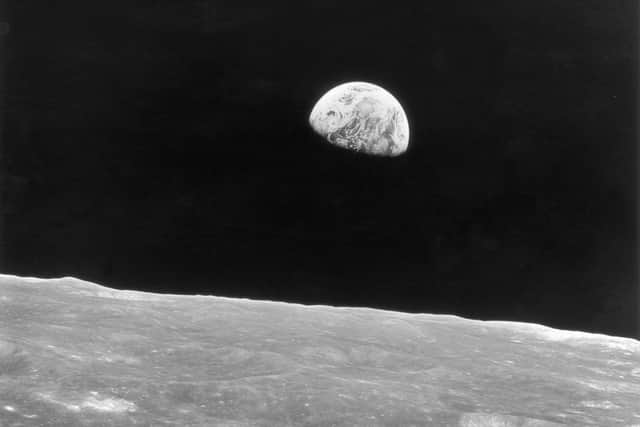Nasa's return to the moon gives some much-needed new hope about humanity's future – Alastair GJ Stewart
It was a “brilliant piece of propaganda”, she says, but nothing more. It's a lovely plot point that neatly frames how far removed humanity has fallen from its ambition. Look around, and that dystopian trajectory is right on track.
Distrust in politicians and the media has never been higher; we question the facts before our eyes, fight more than ever, war more than ever, and gaslight facts on an industrial scale. All to say nothing of impending environmental catastrophe and repeated economic cataclysms, which may not be a problem if AI annihilates us all, of course.
Advertisement
Hide AdAdvertisement
Hide AdAnd then everything seems like it might be alright. I was oddly moved by Nasa naming the four astronauts returning humanity to the Moon this week after a 50-year gap. Artemis II will send its crew further into space than any mission since the 1970s Apollo programme. Bill Nelson, head of the US space agency, hailed “a new era of pioneers, star sailors, thinkers and adventurers”.
Nasa intends to establish a permanent human base for science and exploration and eventually explore Mars. The next mission, Artemis III, currently targeted for 2025, will land the crew at the lunar south pole, a region rich in water ice. It will be the first moon landing since Apollo 17 in 1972. I'm surprised at myself for thinking $93 billion of US taxpayer's money for the Artemis programme is worth every penny. It feels like an optimistic, natural last grab at hope at a time when social progress repeatedly seems to be stuck in the mud and stuck on repeat.
If Nasa does not take the initiative now, space may quickly become an extension of old arguments about nationalisation and privatisation. The exponential build-up of new private space companies is likely to continue. The commercialisation of space for those who can afford it is well underway. Private firms like Jeff Bezos's Blue Origin and Elon Musk's SpaceX are developing giant reusable rockets that could slash deep-space mission costs. It still costs an average of $250,000 to $500,000 for suborbital trips, and flights into orbit are charged more than $50 million per seat. Space tourism will be available to those who can afford it.
Space, in between all the noise, has seemingly come out of nowhere once again as a challenge and an affirming possibility. Among humanity's stark challenges, exploration is underway which could change our understanding of the universe and also our quality of life. Any move which makes discoveries of the universe accessible to only those with the cash or those governments who wish to militarise outer space should be challenged.
But the sad reality is all the evidence points to a continuation of political tensions on Earth in space. China already has the Tiangong space station and plans to construct a base at the Moon's southern tip over the next ten years. From there, it will deploy a telescope with 300 times the field of view of the Hubble. It also intends to collect samples from Mars.


Somehow, seemingly overnight, the realities of space travel have come home to roost with the same alarm, fright, and excitement as artificial intelligence. "Science fiction is any idea," acclaimed author Ray Bradbury once said, "that occurs in the head and doesn't exist yet, but soon will, and will change everything for everybody, and nothing will ever be the same again.” And here we are.
Half a century ago, the Apollo programme transformed our perspective of the world and the human potential to literally reach for the stars. "We choose to go to the moon in this decade and do the other things," said US President John F Kennedy in 1962, "not because they are easy, but because they are hard”.
There was once a time when the western world could share in American global leadership as an extension of a collective celebration of freedom and the human spirit. After the United States 'won' the Space Race with the Apollo Moon landing in 1969, Nasa faced significant financial cuts, ending the Apollo programme. Our entire ambition with space was surrendered to geopolitical concerns and domestic disputes. It would be forgivable if those intervening years saw radical political or social progress to a better, more peaceful world. But where further forward did it get us as a species? It is apt that the famed US flag on the Moon has long been bleached white by ultraviolet radiation.
Advertisement
Hide AdAdvertisement
Hide AdA curse of humanity is that we achieve something, tick it off the list, and move on. Space travel and many other technological and scientific breakthroughs have been largely irrelevant in my lifetime. The conquering of space by vain billionaires means nothing to ordinary people like me. So Nasa is right to hold tight to the public benefits of exploration and research, and must fend off militarisation and exploitation at all costs.
As old happy science-fiction staples like Star Trek get grittier and meaner and further away from the utopian dreams of the 1960s, it is ironic the world may offer a real-life reprieve as we go boldly back to the moon and into the stars.
In December 1968, on Apollo 8, the first mission that flew astronauts around the Moon, Bill Anders photographed Earth's blue disc rising over the lunar landscape. His ‘Earthrise’ image is still one of the most widely recognised images in our culture. Still, it is worth looking at again, and allowing ourselves to feel childish exhilaration about humanity's future as a much-needed balm to these uncertain times.
Comments
Want to join the conversation? Please or to comment on this article.